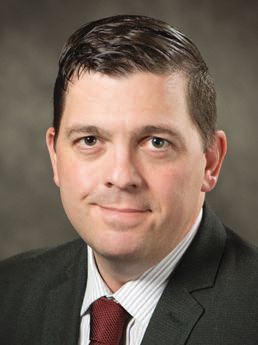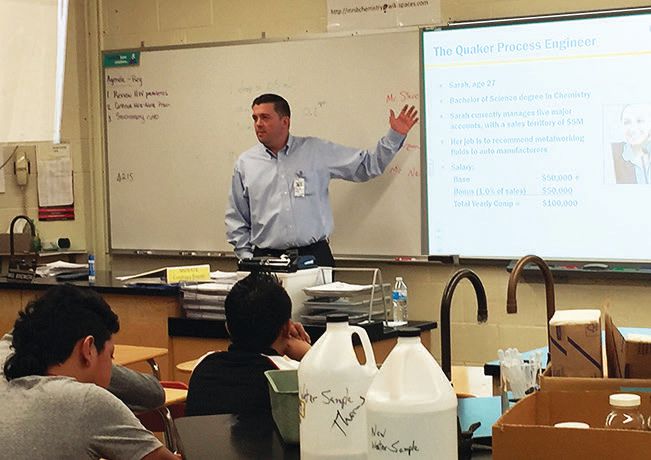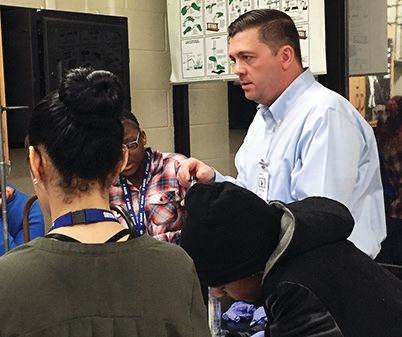20 Minutes With Joe Berquist
By Karl Phipps | TLT 20 Minutes October 2016
Quaker’s vice president and managing director-North America organizes partnerships with local school districts to educate students about STEM.
JOE BERQUIST - The Quick File:
Joseph Berquist is the vice president and managing director of North America for Conshohocken, Pa.-based, Quaker Chemical Corp. Throughout his 20-year career with Quaker, Berquist has worked in almost all aspects of the primary metals and metalworking industries. After graduating from Youngstown State University with a bachelor’s degree in chemical engineering, Berquist began his professional career as a blast furnace engineer and quickly moved on to become a technical service specialist within the steel industry.
Berquist obtained his master’s of business administration in 2008 from the Weatherhead School of Management at Case Western Reserve University. Presently Berquist is responsible for managing commercial development and operations for Quaker in the NAFTA zone. He enjoys being involved in community outreach and holds a board seat as the chair of the Education Committee for the World Affairs Council of Philadelphia.
With support from many of his associates, Berquist has helped Quaker to successfully partner with a local school district to provide STEM (science, technology, engineering and mathematics) education for elementary, middle and high school students.
 Joe Berquist
Joe Berquist
TLT: What first attracted you to pursue a career in the lubricants industry?
Berquist: I wish I could say I had a special desire to get into the industry coming out of college, but my main motivation was simply to get a job. Ultimately, that is what brought me to Quaker Chemical. After beginning my professional life as a blast furnace engineer at AK Steel, I recognized that I enjoyed working in the steel industry.
When presented the chance, I jumped at an opportunity to join Quaker as a technical service specialist in cold rolling. That is where I grew to love our industry, and I am happy to say I still do today. Quaker has been a great place for me to grow my career. I really identify with the customers we serve in the primary metals and metalworking industries and remain passionate about solving problems that help our customers become more profitable.
While the lubricant or processing fluid is usually only a tiny fraction of our customers’ overall cost, often our chemistry and application expertise has a huge impact on their overall total cost. I like the fact that we make a difference.
TLT: What role does giving back to local communities play at Quaker Chemical?
Berquist: As a global leader in our industries, Quaker has a responsibility to be a good corporate citizen. As our company continues to grow, both in size and geography, so has our involvement in our local communities.
For nearly 60 years, The Quaker Chemical Foundation has made a positive impact in the U.S. by awarding grants to qualified 501(c)(3) organizations across the country, as well as offering a matching gift program to our associates and retirees and providing scholarships to children of our associates. In 2011, as part of our company’s global Corporate Social Responsibility (CSR) efforts, we launched Quaker’s Formula for Giving community engagement program, which includes our U.S.-based foundation as well as paid volunteer time off and other charitable activities globally.
TLT: How does Quaker Chemical encourage employees to get involved in their local communities?
Berquist: Quaker’s Formula for Giving community-engagement program is pretty widespread. I’d say our largest investment is to offer paid time off for associates to volunteer in their local communities. We organize Quaker-sponsored group events, and we also allow associates to volunteer on their own. In the U.S., every full-time associate can take up to two days (16 hours) of paid volunteer time off, with the caveat that one of those days must be related to education. Because we are a knowledge-sharing company (sharing our expertise with our customers, industries and colleagues) we have chosen education as a key focus for our community engagement. Overall in 2015, Quaker gave 1,250 community service hours globally.
In addition, we do other things to be involved in our communities. For example, Quaker holds activities at our facilities such as United Way campaigns, Red Cross blood drives and various food, toy and clothing collections. In the U.S., we sponsor science fairs such as The Philadelphia Science Festival and send employees as judges to the Delaware Valley and California State Science Fairs, too. In several countries, including the U.S., Brazil, Mexico and The Netherlands, we open our doors to high school and college students who are interested to see “a day in the life” of working at a chemical company.
 Joe Berquist discusses STEM careers with high school students. (Photo courtesy of Quaker Chemical Corp.)
TLT: Tell us more about Quaker’s Corporate Social Responsibility efforts.
Berquist:
Joe Berquist discusses STEM careers with high school students. (Photo courtesy of Quaker Chemical Corp.)
TLT: Tell us more about Quaker’s Corporate Social Responsibility efforts.
Berquist: CSR isn’t really new to Quaker, as many aspects of this are already in our company’s DNA. For decades we have provided customer solutions that reduce waste, energy, water usage and chemical consumption, while improving operational processes, tool life and the health and safety of workers. In 2013, Quaker implemented a more formalized approach to CSR such as developing a mission and guiding principles, increasing involvement in our local communities and reporting on our activities.
We also look at internal programs that have external benefits. For example, each of our manufacturing locations has an objective to reduce our own carbon footprint and water usage by 10% in the next few years, and we are constantly looking at ways to increase the use of sustainable chemistry concepts in our product design.
TLT: Why is education important to Quaker Chemical?
Berquist: As I mentioned before, Quaker is a knowledge-sharing company. So it’s only natural that we have chosen education as a key focus of our community engagement activities. Of course, STEM education is of particular interest to Quaker, not only to inspire today’s students but to help build a talent pool for the future.
In 2014, we asked some of our larger sites to adopt a local non-profit organization and develop a long-term partnership involving educational activities. Our associates can then use their paid volunteer time to participate in these activities. For example, our global headquarters in Conshohocken, Pa., (outside of Philadelphia) has adopted a nearby, low-income school district (Norristown Area School District (NASD)), and our manufacturing plant in Middletown, Ohio, has also adopted their local school district. Also, our regional headquarters in Shanghai, China, has adopted an organization that helps to improve the educational environment for underprivileged children in rural China.
TLT: How did you approach the Norristown Area School District, and what are you doing with them?
Berquist: When choosing our education partner, we not only looked at the local geography but the need. NASD is not the local school district for our global headquarters in Conshohocken, but it’s just a few miles away and the need is very great. They welcomed us with open arms. When we met with the NASD administration and science faculty to make our pitch, they were very excited and supportive. One of the biggest benefits we bring to this partnership is our ability to conduct laboratory experiments with students. We learned that due to budget constraints in the school district, not all of the high school students were getting a chance to do lab work. So how can you make chemistry interesting without going into the lab? It’s very difficult, and we knew we could help spark that interest.
Our activities are very hands-on and reach all levels of students and teachers. In the elementary schools, we hold Science Exploration Days that use interactive science demonstrations to peak the curiosity of young minds. In the middle schools, we hold Career Days to give students ideas of what career choices are available to them if they work hard and finish high school (not just in STEM disciplines but a variety of careers). Our most ambitious programming is done at the high school level. We develop lesson plans to conduct in-class simulations that are based on real-world problems a person in our industry might experience. Then we co-teach these lessons with the school’s science teachers. Our lessons incorporate (1.) the scientific method, (2.) hands-on laboratory work and (3.) critical thinking. Our objective is to give students examples of what a chemist, engineer or tribologist might experience on the job.
 Joe Berquist engaging high school students in a classroom experiment involving tribology. (Photo courtesy of Quaker Chemical Corp.)
TLT: How have you measured your efforts with the Norristown Area School District?
Berquist:
Joe Berquist engaging high school students in a classroom experiment involving tribology. (Photo courtesy of Quaker Chemical Corp.)
TLT: How have you measured your efforts with the Norristown Area School District?
Berquist: That’s a good question. We have collected survey feedback from both students and teachers at the high and middle schools, and the response has been overwhelmingly positive. Some of the personal comments written by the students can be quite inspirational. It makes all of the work we put into lesson planning that much more rewarding. What has been especially valuable is feedback from the teachers, who have helped us refine our presentations to best impact their students.
While not very scientific, watching young faces light up when something excites them tells me that we are definitely making a positive impact!
TLT: How have Quaker Chemical and the STLE Philadelphia Section collaborated to support STEM education?
Berquist: Last year I was asked to speak about Quaker’s education partnership program at one of the Philadelphia Section meetings. I learned from section board members that STEM is an important initiative for STLE with the society’s annual STEM Camps. Honestly speaking, developing the case studies, lab experiments and teaching guides is a lot of work. So I thought there might be a match here.
When I asked the section if they wanted to help, there was no shortage of volunteers. Other STLE corporate companies and individual members contributed time and materials, as well as critical help in designing some of our case study lessons. Some members even came to the high school at 7 a.m. to help us in the classrooms.
TLT: What has been the outcome in working with the STLE Philadelphia Section?
Berquist: I think it has been beneficial for both of our organizations and the school district. The Philadelphia Section was looking to define its STEM program, and we helped them do that through our experience together. More importantly, I don’t think Quaker would have been able to create six new courses this past school year without the help of so many people from the section.
TLT: Any future plans to expand the Quaker STEM program?
Berquist: Now that we have a set of case studies and experiments that really seem to work, my dream would be to get these made into kits that other STLE local sections can use to promote STEM in high schools around the country and potentially even globally. I know STLE has a strong interest in developing similar kits to teach students about tribology, too. Case study or scenario-based learning is a great way to teach STEM. You can see the students make a connection when they can relate the science lesson in an experiential way. I was not really exposed to case study learning until graduate school. For some reason, this way of studying clicked for me. That’s what gave me the idea to take a similar approach with STEM at the high school level. We have been pleased with the response so far.
TLT: What advice would you provide young people entering or thinking about a career in the lubricants industry?
Berquist: The same advice I would give any young person getting ready to head to college. Don’t be afraid to challenge yourself by taking the road less traveled. Sign up for the hard classes and put in the work—a lifetime of reward is possible. Your chances for an interesting, prosperous career are endless. STEM is a direct path to fulfilling the American Dream. Not enough kids realize that or perhaps not enough are willing to sacrifice what it takes.
TLT: Any thoughts to share with other STLE corporate companies and/or local sections interested in getting involved with STEM?
Berquist: My best recommendation is to start by building a partnership with your local school district. This type of program is not possible without the support and cooperation of the administration and the teachers. It’s also essential to have a good amount of reliable volunteers. You can’t underestimate the preparation it takes to teach a 45-minute lesson. I have so much respect for teachers, now having gone through this.
Lastly, please contact the STLE Philadelphia Section or me personally if we can help you get a STEM program started in your local community.
You can reach Joe Berquist at berquisj@quakerchem.com.